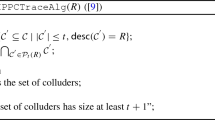Abstract
A fingerprinting code is a set of codewords that are embedded in each copy of a digital object, with the purpose of making each copy unique. If the fingerprinting code is c-secure, then the decoding of a pirate word created by a coalition of at most c dishonest users, will expose at least one of the guilty parties. In this paper we construct a 2-secure fingerprinting code by concatenating an inner (2,2)-separating code with an outter IPP code. The particular choice of the codes is such that allows the use of efficient decoding algorithms that correct errors beyond the error correction bound of the code, namely a simplified version of the Chase algorithms for the inner code and the Koetter-Vardy soft-decision list decoding algorithm for the outter code.
This work has been supported in part by the Spanish Research Council (CICYT) Project TIC2000-1120-C03-03 (ACIMUT).
Access this chapter
Tax calculation will be finalised at checkout
Purchases are for personal use only
Preview
Unable to display preview. Download preview PDF.
Similar content being viewed by others
References
A. Barg, G. R. Blakley, and G. Kabatiansky. Digital fingerprinting codes: Problems statements, constructions, identification of traitors. Technical report, DIMACS 2001-52, 2001.
D. Boneh and J. Shaw. Collusion-secure fingerprinting for digital data. Lecture Notes in Computer Science, 963:452–465, 1995.
D. Chase. A class of algorithms for decoding block codes with channel measurement information. IEEE Trans. Inform. Theory, 18:170–182, 1972.
G. Cohen, S. Encheva, and H. G. Schaathun. On separating codes. Technical report, ENST, Paris, 2001.
J. Domingo-Ferrer and J. Herrera-Joancomartí. Simple collusion-secure fingerprinting schemes for images. Proceedings of the Information Technology: Coding and Computing ITCC’00, pages 128–132, 2000.
V. Guruswami and M. Sudan. Improved decoding of Reed-Solomon and algebraicgeometry codes. IEEE Trans. Inform. Theory, 45(6):1757–1767, 1999.
Henk D. L. Hollmann, Jack H. van Lint, Jean-Paul Linnartz, and Ludo M. G. M. Tolhuizen. On codes with the Identifiable Parent Property. J. Combinatorial Theory, 82(2):121–133, May 1998.
R. Koetter and A. Vardy. Algebraic soft-decision decoding of Reed-Solomon codes. ISIT’00, 2000.
Y. L. Sagalovich. Separating systems. Probl. Inform. Trans., 30(2):14–35, 1994.
Author information
Authors and Affiliations
Editor information
Editors and Affiliations
Rights and permissions
Copyright information
© 2002 Springer-Verlag Berlin Heidelberg
About this paper
Cite this paper
Fernandez, M., Soriano, M. (2002). Fingerprinting Concatenated Codes with Efficient Identification. In: Chan, A.H., Gligor, V. (eds) Information Security. ISC 2002. Lecture Notes in Computer Science, vol 2433. Springer, Berlin, Heidelberg. https://doi.org/10.1007/3-540-45811-5_36
Download citation
DOI: https://doi.org/10.1007/3-540-45811-5_36
Published:
Publisher Name: Springer, Berlin, Heidelberg
Print ISBN: 978-3-540-44270-7
Online ISBN: 978-3-540-45811-1
eBook Packages: Springer Book Archive



